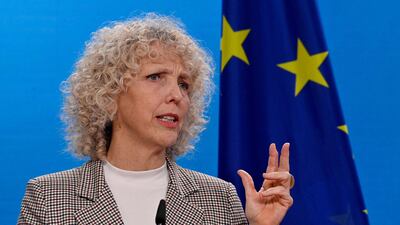The world's climate-change advocates are banking on the Cop28 summit in Dubai to deliver what delegates failed to achieve at the Cairo conference last year, Germany’s special envoy for international climate action said.
“Cop27 was challenging,” Jennifer Morgan told The National in an interview in Abu Dhabi. “The frustrating part was that we did not make much progress at all on actually reducing emissions. That is a big task for the Cop this year.”
The Emirates, which is set to host the leading forum for climate discussion at Expo City in November, has recognised for a long time the solutions and the opportunities that can arise out of shifting from a totally fossil fuel-based economy to one driven by renewable energy, Ms Morgan said.
Her remarks came a day before she met Dr Sultan Al Jaber, the UAE's Minister of Industry and Advanced Technology and Cop28 President-designate, earlier this month.
“The UAE has been thinking for a long time [about] the diversification of their economy,” said Ms Morgan, who is on her first visit outside Europe in her capacity as climate envoy. “And they think big.”
The UAE and Germany are working together to boost their partnership on green initiatives and also studying ways to work with other countries to scale up their efforts on renewable energy, she said.
Apart from hosting Cop28, the UAE announced 2023 as the Year of Sustainability and is well-placed to drive consensus on solutions to slash emissions and ensure the goal of limiting global warming to 1.5 degrees Celsius above pre-industrial levels by 2030 remains within reach.
At the Munich Security Conference in February, Dr Al Jaber said his main priority would be to keep the plans to hit that target alive.
“I have no intention whatsoever of deviating from the 1.5ºC goal,” he said. “Keeping 1.5ºC alive is a top priority and it will cut across everything I do.”
As the first country in the Middle East to sign and ratify the Paris Agreement and announce a Net Zero by 2050 initiative, the UAE is in an ideal position to steer an innovative and collaborative approach to sustainable development.
“The sense I have is that they are very serious about driving forward to that net-zero goal,” Ms Morgan said.
The UAE and the region are particularly vulnerable to the impact of climate change, so the aim this year will be to have a transformational Cop summit that can help the world to move forward.
Those and other energy and climate issues will feature in the Petersburg Climate Dialogue in May, a forum Germany hosts with the incoming Cop presidency every year to initiate the wider discussions at Cop.
Loss and damage
Started by former German Chancellor Angela Merkel in 2010, the Petersberg Dialogue serves as a platform to build political consensus to resolve differences in negotiations.
While several issues remained unresolved at Cop27, the forum did provide some breakthroughs, said Ms Morgan, who “co-facilitated” the negotiations on loss and damage.
The phrase, according to the UN, refers to the negative consequences arising from the risks of climate change, including rising sea levels, lasting heatwaves, desertification, the acidification of the sea and extreme events such as bushfires, the extinction of species and crop failure.
One breakthrough at Cop27 was the establishment of a loss and damage fund that will provide financial support to nations most vulnerable to climate change.
While the pledge has been made, the fund’s size, sources and governance will be negotiated this year, Ms Morgan said.
“The most vulnerable countries had been working for 30 years to see how they were going to get the support for loss and damage. On that issue, it was a success,” she said.
Some nations such as Denmark, Belgium, Germany and Scotland, as well as the EU, have made symbolic funding commitments to cover loss and damage.
The UN estimates that the loss and damage from climate change could cost developing nations as much as $580 billion a year by 2030 and up to $1.8 trillion in 2050.
“The fund will support the most vulnerable countries to address loss and damage, and exactly what that means will be negotiated,” Ms Morgan said.
Another big task for this year’s Cop28 summit will be to assess how each country can raise its own emissions reduction target and how finance can be arranged to help developing countries achieve the global goal of halving emissions by 2030.
“That didn’t get the attention or the leadership last year but it needs to happen this year,” she said.
Germany is in the midst of a transition away from fossil fuels and has set a date to phase out coal. The nation already generates about half of its electricity from renewable sources, and plans to raise that to 80 per cent by 2030.
“We are decarbonising our entire economy and we are making good progress on that,” Ms Morgan said. “That’s also a priority of the Cop President.”
Effects of war
The Ukraine-Russia conflict has stressed the importance of phasing out fossil fuels, particularly from Russia, which Germany has achieved completely, Ms Morgan said.
More than half of Germany’s gas was imported from Russia before the war began. However, all imports of gas, oil and coal from Russia have since been halted.
Germany is now looking to Norway, the Netherlands and a number of other countries for gas imports and has passed a law to scale up the use of renewable energy to 80 per cent by 2030.
“The war has taught us that … renewable energy and energy efficiency is the way to go and it is in our interest to scale that up,” she said.






